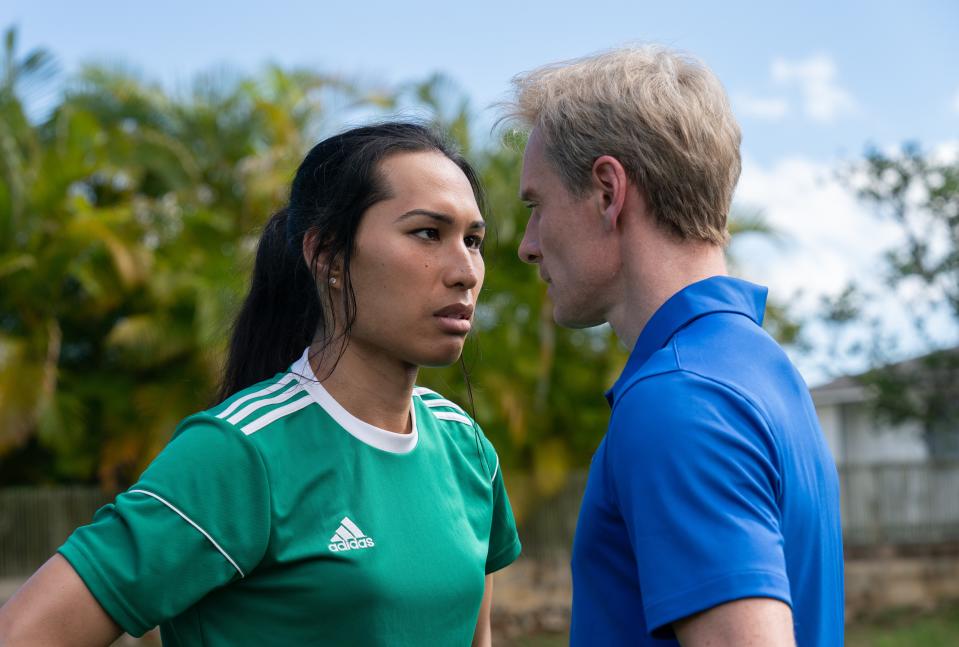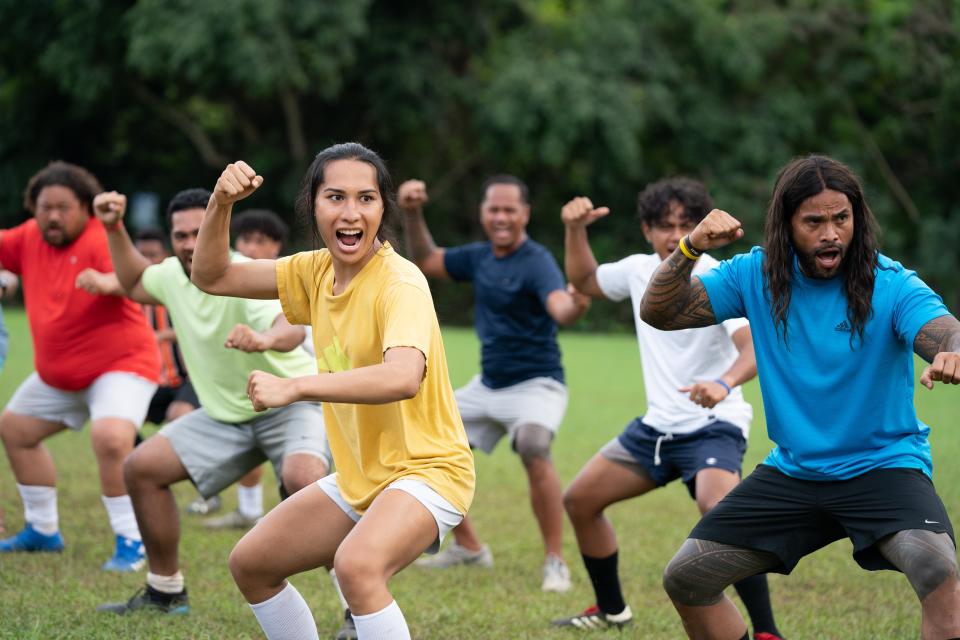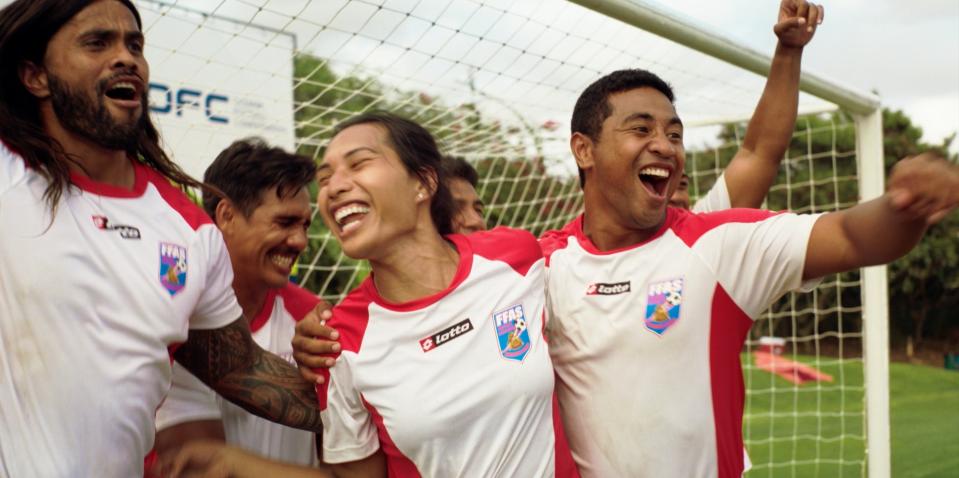Meet the Trans Soccer Trailblazer Who Inspired Taika Waititi's New Movie

- Oops!Something went wrong.Please try again later.
- Oops!Something went wrong.Please try again later.
- Oops!Something went wrong.Please try again later.
Photographs: Searchlight Pictures, Getty Images; Collage: Gabe Conte
It takes a while to get a hold of Jaiyah Saelua. But when the 35-year-old American Samoan football star finally appears on my Zoom screen for our interview, it’s easy to forgive her. “I’m so sorry,” she says. “The data on the island is always terrible.”
The island in question is American Samoa: Saelua’s home, and the setting for the new Taika Waititi movie Next Goal Wins, inspired in part by her life.
The film tells the story of the American Samoa soccer team’s David-and-Goliath quest to qualify for the 2014 FIFA World Cup and the Dutch-American coach, Thomas Rongen (played by Michael Fassbender), who helped them get there. That story was first told in the documentary of the same name, directed by Mike Brett and Steve Jamison (who serve as producers on Waititi’s film) and released in 2014. But in Waititi’s retelling, Saelua’s journey (as portrayed by nonbinary actor Kaimana) becomes the focus of the story.
“In the documentary, I was highlighted as one of the stories that made a team, and that was it,” she says. “But in Taika's version, I was thrust into this lead role—not me, but Kaimana as me—and it was humbling… He was just very generous to me, giving [my story the] lead role, giving me scores I never had, things like that.”

The film also explores American Samoan’s culture of fa’afafine, fluid gender roles that are an integral part of traditional Samoan culture. Saelua identifies with this community and was excited to see the fa’afafine identity highlighted on the screen. “It was testifying to audiences that this is how it is in the Pacific,” Saelua says, “And it's okay to be this way.”
With a flower in her hair, palm trees blissfully waving behind her and sunshine streaming in from everywhere, Saelua spoke to GQ about her journey, inspiring not one but two movies, and what she’s been up to since.
Your story has already been immortalized in the Next Goal Wins documentary but of course, a Taika Waititi film starring Hollywood stars is a different thing entirely. Do you remember when you found out the film was getting made, and the caliber of the talent involved?
The documentary came out in 2014 and I think it was 2016 when I got invited to a dinner by [the documentary’s directors] Steve [Jamison] and Mike [Bett] with Taika Waititi. I was curious who it was. I'm not a film person—I’m all about sports. I like watching films but I don't dive deep into who the directors are. I mean, I barely know names of actors—I just know who they are in the movies.
Doing a little bit of my research, I realized that the standing Taika has in Hollywood was pretty impressive. And it made me nervous going into the meeting. But I realized very quickly that he's so relatable, charming and funny—a human being.
During the time he was preparing to shoot the film, would he consult with you?
Not him directly, but people from the film [would reach out and ask for my thoughts] in terms of the cultural things, the identity of the Samoan faʻafafine, sports things even. I was in the loop a little bit, in regards to the creation of the film but it wasn't until 2019, when I got invited on set, when they were filming in Hawaii, that it actually hit me that it was a much bigger project than I had originally anticipated.
The film tells the amazing story of the team’s attempt to qualify for the 2014 FIFA World Cup, and how you guys were able to make a mark in your own way, against all odds. But I know that since then, you've had such a rich, really eventful life.
Oh, my gosh. It's been a surreal life-changing experience since 2011 [when Rongen took over the team]. I’ve been recognized by FIFA as the first out transgender person in the world to play in a FIFA sanctioned tournament. I've always been a faʻafafine, but they just didn't recognize it until 2011, because I had already gone through some of my transition.
After the recognition, and then the documentary coming out in 2014, my platform was amplified a little bit. I did a tour for the documentary around the world—we did so many film festivals. Then just earlier this year, Gianni Infantino, the FIFA World president, officially recognized me as a FIFA legend.

That's amazing.
Yeah, we had a small ceremony after the Women's World Cup. Also, I was the only trans woman, out of the 800 delegates that were invited around the world, to attend the FIFA Women's Football Convention.
I mean, they've just been so receptive. I was on the cover of FIFA Magazine in 2016, the September issue. I got invited to sit on the panel that chooses the FIFA Diversity Award for six straight years.
I didn't realize that there hasn't been a trans person—a non-binary faʻafafine person—to represent their respective country around the world. It caught me off guard, because when I was recognized by FIFA as the first transgender [athlete], I thought, "Wait, what? There's such a thing?" Because I come from a country where it's so normal, there's no stigma or taboo attached to the identity of faʻafafine.
In my mind, I was like, "Okay, there's more than 200 countries who are members of FIFA." A lot of them claim to be progressive countries. And I know the level of play might be different—they might be a lot more up there in the level of play. But it dawned on me that FIFA's been around for so long, and so many countries are members, and no trans person has ever come out to represent their country. It took one of the worst countries in the world—in terms of a sport, and one of the smallest members in FIFA—[for it to happen].
You grew up in a country where there’s always been so much acceptance for trans people. When you became one of the public faces of the sport, did you encounter any discrimination from outsiders?
I mean, on social media it happens. It's a completely different world on social media—people just feel stronger when they're on the keyboard. But I haven't [really encountered that], no.
I think it stems from the fact that I'm a trans woman that plays on a men's team. I align with both narratives—the conservative far right narrative, where trans women should play in men's sports, and then the trans, queer, rainbow narrative, of being inclusive and just visible in society. I know it would've been a completely different story if I had been a trans woman who had played for our women's national team.
When the film premiered at the Toronto International Film Festival, a few critics called it transphobic, or said it—
Yeah, transphobic and a white savior story.
Were you surprised to hear that?
That's their job [as critics], to dissect a film… I mean, if that was their take, good for them.
I think, just to address those things, I don't think the film is transphobic—I know it's not. I mean, it's not transphobic because it portrays transphobia. It portrays events that trans people actually experience. These are real life experience of trans people, of faʻafafine, and if it made you uncomfortable, good. Because that's what people should feel. That's what people should know, so that they can step up when they do [see people] experience transphobia in real life situations. That's my take on that.
Then also the white savior narrative, you can't use that, because it's based on a real story. Thomas literally is a white man who came to American Samoa and changed the story of [our team]. But it goes both ways. It's funny that critics were able to see that side of the story, but weren't focused much on how we, as Brown people, helped change his life.
Yes, my takeaway was that the team saved him, really. And to your point, I agree. If we just pretend bad things don't happen to queer people and it's all fine and dandy, then we're doing a disservice to the community too.
Exactly. We have to show our real life experiences on the big screen, as comfortable or as uncomfortable as they may be, as traumatizing as they may be…
[For audiences to see] trans people on the screen, it has the power to create allies, or at the very least sympathizers with our experiences. I think it's important.
Also, these are experiences that were true to me, as well. I had so many breakdowns during my transition, and things like that actually happened. Those are real.
The whole transphobia thing, it didn't sit well with me. I'm like, "Okay, they say it's transphobic, but the lead female in the movie is a trans woman."
Obviously, especially for this next generation of trans athletes coming up, that's an issue that they’re running up against. As someone who’s now an icon of diversity in the sport, what message do you tell these kids?
I truly feel that it takes a lot of courage to challenge the norms, especially in the sports arena. I can't imagine what they're going through, and I can't speak on those experiences, because it's not my experience personally.
I guess what I'm saying is my privilege is having grown up in a place where I don't need to feel validated in my experience, and I don't need to pursue women's sports. Every single faʻafafine in American Samoa, whether it be volleyball, even post-transition, whether it be volleyball, soccer, rugby, even—there are so many faʻafafine who play sports—we all play for the men's side, and it's a testament to our upbringing, our community, and our society. I think the experiences of young trans folk who venture into women's sports, it speaks more to their surroundings and their environments, the people and the communities that they are from.
I do commend them for their courage. I hope sports, in the future, becomes a place for all folk to express themselves, and just be themselves. Because for a lot of countries, especially for women, sports is the escape for them. Hopefully in the future, for queer folk, it becomes that in the future, it becomes our escape. It's always been a second home for me. I hope that more young queer folk in the future get to have that experience.

Watching your story in the documentary and then the film, it's so apparent that you've always been such a strong leader. Was that always inherent in you or something that came later?
Yeah, I was born into a family that is just leaders. My dad's the representative of our district. My mom is the budget director. I grew up with that sense [of leadership and responsibility], and those were my experiences growing up.
By the time I was able to take on leadership roles, I became really good at it. Being a captain of the national football team of American Samoa just came naturally to me. For some reason, people listened.
A lot of faʻafafine have leadership roles in our communities. It's not an issue, or even something to celebrate [in our culture], that we are faʻafafine in leadership positions—it's just normal for us.
Years into your career, you're obviously still very much passionate about football. What do you love about the game?
When I first started, when I was 11 years old, it was literally the only competitive sport that we had to play. After the 31-0 loss against Australia, [the Football Federations Development Program] went back to the drawing board and thought, "Okay, let's stop developing athletes when they're already adults. Let's start from the grassroots level." I was a product of that development program.
And at the time, at 11 years old, at the grassroots level, it was a mixed sport. It's girls and boys, versus girls and boys. And I realized early on that I was good. I was the Island-wide Most Valuable Player—which is the best player on the Island—at 11, 12 and 13 years old. Everything about the sport was appealing to me as a child.
And then growing up, I realized that it has a power to unite the world. It has the power to break down political barriers. It has so much power to make changes—and it does.
FIFA's influence on the world is just massive. I love that. I just keep getting drawn into the energy that FIFA has, and the sport has.
Originally Appeared on GQ

